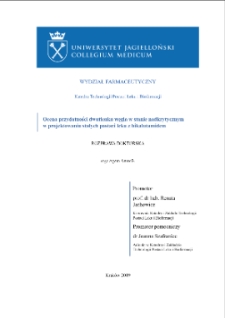Obiekt
Tytuł: The assessment of suitability of supercritical carbon dioxide in the design of solid dosage form containing bicalutamide
Abstrakt:
The aim of the study was the assessment of suitability of supercritical carbon dioxide in the design of solid dosage form containing bicalutamide. Planetary ball milling method was applied for comparison. Hydrophilic carriers, i.e. Macrogol 6000, Poloxamer® 407 and PVP K-29/32 were chosen. For each carrier, optimal process parameter were established. Process pressure and temperature that allowed to achieve the highest improvement in bicalutamide dissolution rate. Supercritical carbon dioxide treatment also caused changes in particle size, morphology, and a decrease in the crystallinity degree of bicalutamide in obtained solid dispersions. The decrease in crystallinity degree of active substance was also achieved when applying planetary ball milling with Macrogol 6000 or Poloxamer® 407. When processed with PVP K-29/32, bicalutamide underwent mechanochemical activation resulted in drug amorphization, but the amount of bicalutamide dissolved depend on the number of milling cycles. The next part of research work was the design of solid dosage forms containing bicalutamide. Six tablets formulations were designed. The properties of final blends, tablets and minitablets as well were evaluated. The highest amount of bicalutamide was released from tablets containing solid dispersion with Macrogol 6000 obtained by supercritical carbon dioxide method. Stability studies of tablets and mini ; tablets packed into PVC/Al blisters and stored in climate chambers at either 25°C/60%RH or 45°C/70%RH showed changes in parameters as disintegration time and bicalutamide dissolution rate. Stability studies should be continued using a more barrier packaging material to ensure better dosage form stability.
Miejsce wydania:
Stopień studiów:
Dyscyplina:
Instytucja nadająca tytuł:
Promotor:
Jachowicz, Renata ; Szafraniec-Szczęsny, Joanna
Data wydania:
Identyfikator:
Sygnatura:
Język:
Prawa dostępu:
Kolekcje, do których przypisany jest obiekt:
Data ostatniej modyfikacji:
13 mar 2023
Data dodania obiektu:
29 cze 2020
Liczba wyświetleń treści obiektu:
10
Liczba wyświetleń treści obiektu w formacie PDF
0
Wszystkie dostępne wersje tego obiektu:
http://dl.cm-uj.krakow.pl:8080/publication/4352
Wyświetl opis w formacie RDF:
Wyświetl opis w formacie OAI-PMH:
| Nazwa wydania | Data |
|---|---|
| ZB-131393 | 13 mar 2023 |
Obiekty
Podobne
Antosik-Rogóż, Agata
Pieszczek, Barbara
Jamróz, Witold
Krupa, Anna
Brniak, Witold
Kurek, Mateusz
Woyna-Orlewicz, Krzysztof

